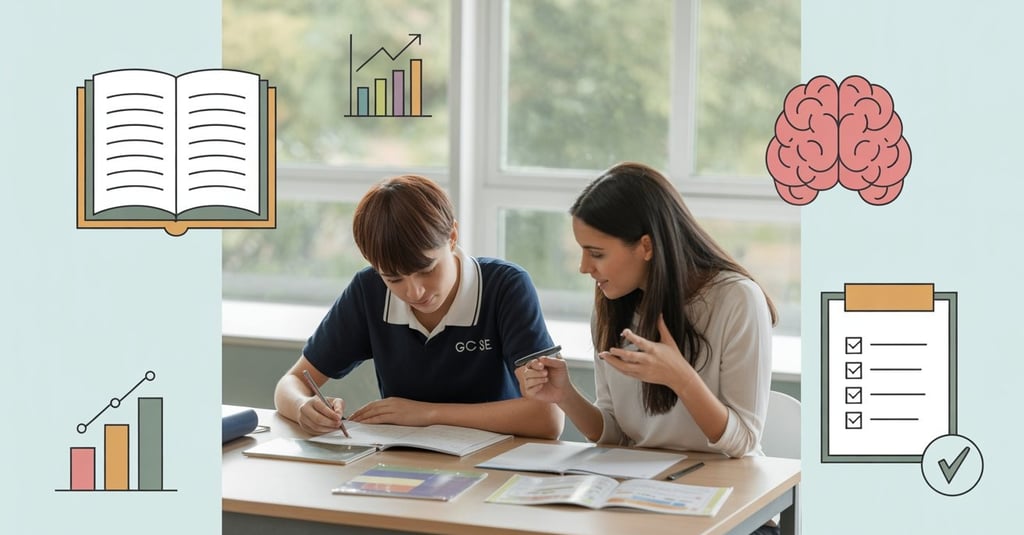SEN Specialists : Special Needs Tutors | GCSE - IGCSE Tuition |
Tackling Under‑Achievement in GCSE / IGCSE: Bespoke Teaching, Tailored Worksheets, Exam Technique, Mentoring and Executive‑Function Coaching
Discover how SENSpecialists.org helps under-achieving GCSE & IGCSE students succeed through bespoke teaching, tailored worksheets, exam technique & mentoring.
James


This document explains how our bespoke approach at SENSpecialists.org improves grades for students who are underachieving in GCSE and IGCSE, including those with Moderate Learning Difficulties (MLD) and other SEN profiles. We outline why standard textbooks, revision books, and school notes are not a catch‑all solution, and how personalised learning design, targeted worksheets, examiner‑informed technique, mentoring and executive‑function support lead to measurable gains.
Why do some students underachieve at GCSE / IGCSE?
Persistent gaps in foundational literacy or numeracy make higher‑level content inaccessible.
Slow processing speed or limited working memory reduces the ability to complete exam tasks under time pressure.
Passive study habits (rereading notes/textbooks) instead of active retrieval and practice.
Low motivation, anxiety, or negative classroom experiences that limit engagement.
Executive‑function weaknesses: planning, organisation, time management, and sustaining focus.
Mismatch between the learner’s modality/pace and the resources used.
What do we do differently (how we convert potential into improved grades)?
Diagnostic baseline: identify knowledge gaps, processing profile and specific exam‑skill weaknesses.
Personalised learning design: short, sequenced lessons that target weak skills first to close gaps before adding new content.
Bespoke worksheets: scaffolded, multisensory and tightly linked to exam question types — from worked examples to independent timed practice.
Explicit exam technique: answer planning, heuristics by question type, time allocation and effective use of access arrangements.
Retrieval practice and spaced review built into every lesson and worksheet to strengthen long‑term retention.
Executive‑function coaching: planners, micro‑goals, timers, checklists and environmental strategies for consistent, independent study.
Mentoring: weekly check‑ins to sustain motivation, manage anxiety and translate skills into classroom and exam performance.
Continuous data loop: adjust materials and pacing based on progress — not a fixed chapter schedule.
Why standard textbooks/revision guides/school notes are not a catch‑all?
Assume average processing, attention and study skills; not scaffolded for MLD, ADHD, dyslexia or EF weaknesses.
Content‑heavy and passive: promote rereading rather than active retrieval or scaffolded problem solving.
Lack targeted guidance on exam strategy, answer structures, and timing under pressure.
Do not teach the routines and self‑management skills needed for sustained progress.
Result: students may know content superficially but underperform in real exam conditions.
Proven strategies we apply (research‑aligned)
Chunking and worked examples to reduce cognitive load and model problem solving.
Multisensory materials (visuals, mind maps, audio prompts) to strengthen encoding and recall.
Frequent low‑stakes testing and retrieval practice to boost retention and confidence.
Spaced practice across weeks, not cramming.
Timed past‑paper practice with examiner feedback to transfer knowledge to performance.
Executive‑function scaffolds: externalised plans, micro‑tasks (10–20 minutes), visible timers and checklists.
Mentored reflection to internalise strategies and sustain effort.
Access arrangements are integrated into the preparation
We prepare and practise with the access arrangements a student is eligible for (e.g., extra time, reader/scribe, rest breaks, modified papers) so their exam performance reflects true ability. We also help families gather evidence early so arrangements reflect the student’s normal way of working.
Practical outcomes that parents and schools see
Improved mock and final grades (e.g., realistic gains within 8–12 weeks when instruction is targeted).
Better pacing and completion of exam papers; fewer blank responses; reduced anxiety.
More consistent homework completion and independent revision routines.
Documented evidence that supports appropriate access arrangements.
Case study: from underachieving to progressing
A Year 10 student, Alex, struggled with reading comprehension and slow writing speed. Our learning designer created a 12‑week plan targeting reading fluency and structured writing. With regular 1:1 sessions, scaffolded worksheets, retrieval practice and exam‑technique coaching, Alex improved his mock GCSE English grade from a 3 to a 6, and regained confidence.
Example: how a bespoke worksheet build exam technique?
Warm‑up (2 mins): one retrieval question on the topic.
Worked example (5 mins): tutor models planning and a structured answer using a clear framework.
Guided practice (10 mins): partially completed scaffold, the student fills in with prompts and sentence starters.
Timed mini‑task (10–12 mins): student answers a focused question under timed conditions.
Immediate feedback (5 mins): highlight one strength and one specific next step.
Follow‑up (homework): 2–3 retrieval flashcards tied to the skill just practised.
8–12 week GCSE / IGCSE improvement plan (template)
Weeks 8–12: Foundation & familiarisation — diagnostic lessons, priority gaps, start timed practice under adjusted conditions.
Weeks 4–7: Strategy & confidence — deep revision with mind maps, cue cards and regular mock questions with examiner feedback; weekly mentoring check‑ins.
Weeks 1–3: Review & readiness — short daily tasks, wellbeing focus (sleep, nutrition), confirm access arrangements with the exam centre.
How can we tailor this now?
Share the subject and topic (e.g., GCSE English 16‑mark analysis, IGCSE Maths algebraic fractions) and the student’s baseline/target grades. We will draft a bespoke worksheet and an 8–12 week plan aligned to examiner expectations and the student’s executive‑function profile.
Request a Tutor or Book a Free Learning Assessment to discuss your child’s needs.
About
Tailored educational support for unique learning needs in Singapore, UK, Malaysia, Philippines, Indonesia, Thailand, Laos, Cambodia & China.
EDUCATION FOR HEALTH UK (EFH) 2025. Copyright . All rights reserved.
Pages
Support Pages
What Next After GCSE and A Level or IB ?
